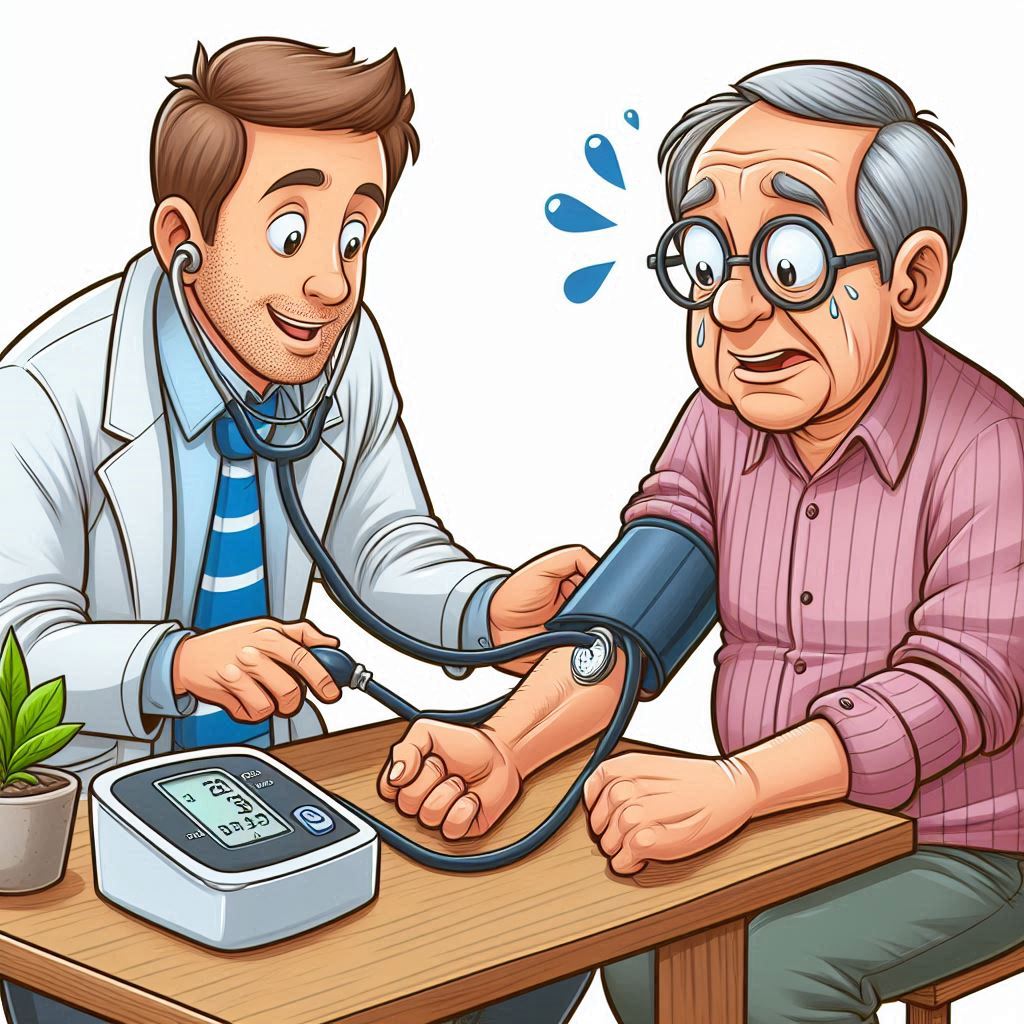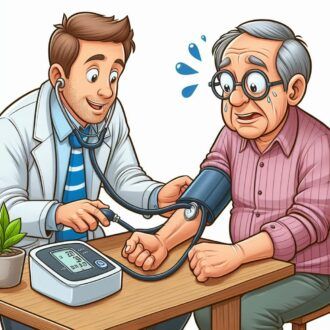
Before I go any further, I am not a Dr. This article was written as a stepping stone to understanding high blood pressure and the dangers involved with this condition. If you suffer from high blood pressure ALWAYS consult your medical team of professionals to begin a treatment plan.
High blood pressure, also known as hypertension, is a common condition that affects millions of people worldwide, including a significant number of senior citizens. It is often called the “silent killer” because it typically has no symptoms but can lead to serious health problems if left untreated. This article aims to provide an in-depth understanding of high blood pressure, its causes, effects on the body, associated health conditions, and ways to manage and control it, especially through lifestyle changes.

Check out my Home & Living products featuring 10” wall clocks, 5.75” X 8” hardcovered journals with 150 lined sheets (75 pages), 110, 252, 520, or 1014 piece jigsaw puzzles, and 3 X 3, 4 X 4, or 6 X 6 magnets.
What is High Blood Pressure?
Blood pressure is the force exerted by the blood against the walls of the arteries as the heart pumps it around the body. It is measured in millimeters of mercury (mmHg) and recorded as two numbers:
- Systolic pressure (the higher number): The pressure in the arteries when the heart beats.
- Diastolic pressure (the lower number): The pressure in the arteries when the heart rests between beats.
A normal blood pressure reading is generally considered to be around 120/80 mmHg. High blood pressure is typically defined as having a consistent reading of 130/80 mmHg or higher.
Causes of High Blood Pressure
Several factors can contribute to the development of high blood pressure, including:
- Age: As people age, their blood vessels naturally lose some of their elasticity, which can increase blood pressure.
- Genetics: A family history of hypertension increases the likelihood of developing the condition.
- Lifestyle Choices:
- Diet: High intake of salt, processed foods, and unhealthy fats.
- Physical Inactivity: Lack of regular exercise.
- Weight: Being overweight or obese.
- Alcohol and Tobacco Use: Excessive alcohol consumption and smoking.
- Health Conditions:
- Kidney Disease: Impaired kidney function can affect blood pressure regulation.
- Diabetes: High blood sugar levels can damage blood vessels.
- Sleep Apnea: Repeated interruptions in breathing during sleep can increase blood pressure.
- Stress: Chronic stress may contribute to hypertension.
How High Blood Pressure Affects the Body
Uncontrolled high blood pressure can have widespread effects on the body, leading to serious and potentially life-threatening conditions:
- Heart Disease: Hypertension can cause the heart to work harder, leading to hypertrophy (thickening of the heart muscle) and eventually heart failure. It also increases the risk of coronary artery disease, heart attack, and arrhythmias.
- Stroke: High blood pressure can damage and weaken the brain’s blood vessels, increasing the risk of stroke.
- Kidney Damage: Hypertension can damage the blood vessels in the kidneys, leading to chronic kidney disease or kidney failure.
- Vision Loss: Damage to the blood vessels in the eyes can result in retinopathy and vision impairment.
- Aneurysm: Increased blood pressure can cause blood vessels to weaken and bulge, forming an aneurysm, which can be life-threatening if it ruptures.
- Peripheral Artery Disease: Hypertension can lead to narrowed arteries, reducing blood flow to the limbs and increasing the risk of peripheral artery disease.
Health Conditions Caused by High Blood Pressure
In addition to the conditions mentioned above, high blood pressure can also lead to:
- Metabolic Syndrome: A cluster of conditions, including high blood pressure, high blood sugar, excess body fat around the waist, and abnormal cholesterol levels, increasing the risk of heart disease, stroke, and diabetes.
- Dementia: Reduced blood flow to the brain caused by narrowed or blocked arteries can lead to cognitive decline and dementia.
- Sexual Dysfunction: Hypertension can impair blood flow, leading to erectile dysfunction in men and decreased libido in women.
Ways to Control High Blood Pressure
Managing high blood pressure involves a combination of lifestyle changes and, in some cases, medication. Here are some effective ways to control hypertension:
- Medications: Doctors may prescribe antihypertensive medications such as diuretics, beta-blockers, ACE inhibitors, calcium channel blockers, or ARBs (angiotensin II receptor blockers).
- Regular Monitoring: Keeping track of blood pressure readings at home and regular check-ups with a healthcare provider.
Lifestyle Changes to Lower High Blood Pressure
Implementing healthy lifestyle changes is crucial in managing high blood pressure. There are many different opinions on how diets affect high blood pressure. Below are some of those opinions. Again, always consult your medical team of professionals for the course of action that’s best for you.
- Healthy Diet:
- Low Carb/Keto Diet: In some of the latest studies, some Dr’s are now recommending a low carb/ketogenic diet. They state it has been shown to lower blood pressure among other medical benefits.
- Reduce Sodium Intake: According to the National Institute of Health, limiting salt intake to less than 2,300 mg per day (or 1,500 mg for greater blood pressure reduction) can significantly lower blood pressure.
- Increase Potassium: According to the World Health Organization, consuming potassium-rich foods like bananas, oranges, spinach, and sweet potatoes can help balance sodium levels and reduce blood pressure.
- Regular Exercise: Engaging in at least 150 minutes of moderate-intensity exercise (e.g., brisk walking, cycling, swimming) per week can help lower blood pressure.
- Maintain a Healthy Weight: Losing excess weight, especially around the waist, can significantly reduce blood pressure. Aim for a BMI (body mass index) between 18.5 and 24.9.
- Limit Alcohol Consumption: Drinking alcohol in moderation—up to one drink per day for women and up to two drinks per day for men—can help manage blood pressure.
- Quit Smoking: Smoking cessation improves overall cardiovascular health and reduces the risk of hypertension-related complications.
- Stress Management: Techniques such as deep breathing, meditation, yoga, and mindfulness can help reduce stress and lower blood pressure.
- Adequate Sleep: Getting 7-9 hours of quality sleep each night is essential for overall health and blood pressure regulation.
- Reduce Caffeine Intake: While the effects of caffeine on blood pressure are still debated, reducing caffeine intake may benefit those sensitive to its effects.
- Stay Hydrated: Drinking plenty of water throughout the day helps maintain proper blood volume and pressure.
- Monitor Blood Pressure Regularly: Keeping track of blood pressure at home and regular check-ups with a healthcare provider can help manage and adjust treatment as needed.
Final Thoughts
High blood pressure is a serious condition that requires careful management to prevent complications. By understanding its causes, effects on the body, and associated health conditions, individuals can take proactive steps to control hypertension. Adopting a healthy lifestyle that includes a balanced diet, regular exercise, stress management, and other positive habits can significantly lower blood pressure and improve overall health. For seniors, these changes can lead to a longer, healthier, and more active life.
As far as my journey with a low-carb/ketogenic diet goes, after 9 months I still take blood pressure pills but have been able to reduce the dosage I take. I monitor my blood pressure every day and work closely with my Dr on any decisions about medication.
Always consult with a healthcare provider before making any significant changes to your health regimen, especially if you have pre-existing conditions or are taking medications.
Did you enjoy this post? Do you want to know when the next post comes out? Consider subscribing. I only send update emails once a week, usually on Friday. Try it out. You can unsubscribe at any time.

